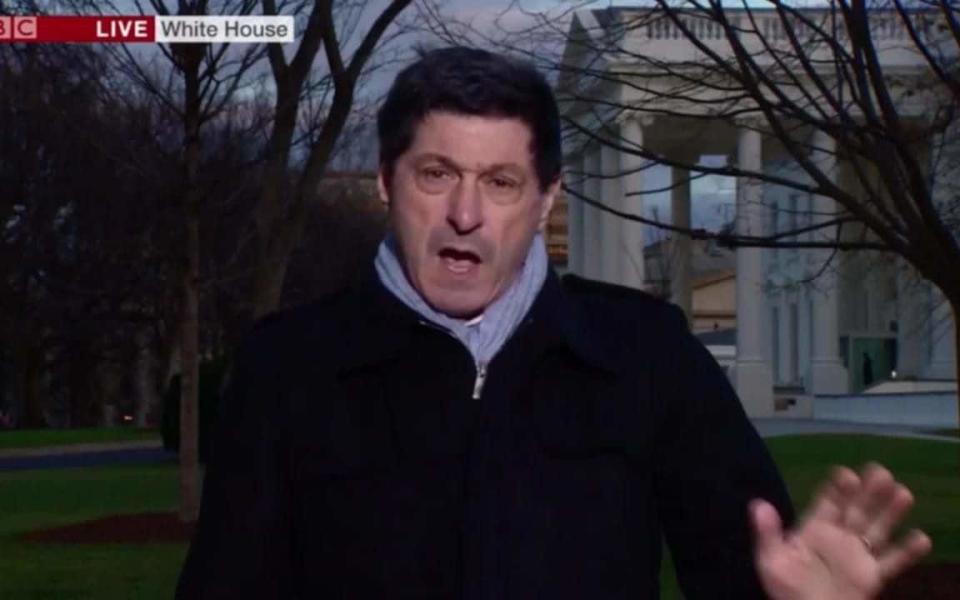Jon Sopel: ‘Trump is leaving – but Washington has changed forever’

- Oops!Something went wrong.Please try again later.
- Oops!Something went wrong.Please try again later.
It’s been strange this past week. I have woken up alone. Sure, there has been birdsong outside my bedroom window, but no Donald Trump tweets to wake up to next to me. The alert I receive on my phone every time his thumbs get busy is redundant; the messages I receive at random times at all hours of the night, gone. It’s been the permanent accompaniment to my life – and virtually every other Washington journalist I know – these past four years. But no longer. Life seems a bit monochrome, to be honest. My bedroom feels empty.
In medieval times they cut out your tongue for lying. This is the social media, algorithm-driven, 21st century, tech world equivalent.
The storming of Congress by Trump supporters on January 6 was simultaneously one of the most shocking things I have reported on, and yet the most predictable; inevitable even. For four years Trump has denigrated the institutions of government, whenever lawmakers or the judiciary did something he didn’t like. He has fuelled the suspicion in his supporters that there is something rotten at the heart of Washington.
I had been at the rally outside the White House where the president addressed the crowds a couple of hours earlier. I have lost count how many of his events I have attended. The first was in Dallas in 2015, 15 months before the presidential election. I guess he had pulled in an audience of around 20,000. And though this was an older crowd, they had the excitement of teenagers going to see a boy band.
The thing that Trump critics miss is that he is a great entertainer. He stands on stage, and he plays his audience brilliantly. He is funny. He will read from the teleprompter and if he senses he is losing his audience, he will junk the prepared text, and go wherever his mind takes him. There is jeopardy. He takes risks. Sometimes it is brilliant; occasionally catastrophic. And his audience love it.

Initially, the admiration for Trump from his base was that though he wasn’t perfect, might not always tell the whole truth, might be a bit ‘naughty’, he stood up for them; he would be their champion. The outsiders, who felt neglected by the Washington elite, had a knight in shining armour – with a bit of tarnish around the edges.
But this month, I realised that something has changed. Watching the crowd at the rally on the White House, I realised there is a cult-like devotion. The only truth that existed came from the lips of Trump and his most loyal acolytes, so any argument you put that Joe Biden had won fair and square was met with total incredulity – and fury.

It has been described as America’s darkest day; the day when the beacon of democracy for the rest of the world was nearly extinguished, as rioters ran amok, defiling the most sacred sanctum of American democracy. We’ve all seen scenes like this in third world, tin pot regimes. But in America?
Some have sought to argue that what unfolded on January 6 and the days leading up to it was the system working. The attempts led by Trump to have the results overturned had failed. He had bent and bent the fragile constitution to breaking point, but when it looked like it was going to snap, the safety mechanisms – the much-vaunted checks and balances – kicked in; the strength and durability of American democracy had prevailed.
What is easy to forget is how close it came. What if the VP, Mike Pence, had gone along with the president’s demands not to certify the results? Ditto the Senate majority leader, Mitch McConnell – both of whom had hitherto shown all the backbone towards Trump of cooked spaghetti. What if the Secretary of State in Georgia had acceded to the president’s slightly menacing demands (that we’ve all now heard the recording of) to “recalculate” the ballots and given him the extra 11,780 votes that he needed to win? What if a lowly Michigan official had bent to the president’s will and refused to certify Joe Biden’s comfortable victory in the state?
Or to put it another way, does American democracy rely on a handful of people doing the right thing to survive – even though it is at huge personal cost to themselves, when surrender would have been easier? The Georgia election official needed security 24/7 as a result of standing up to the president – an action that has resulted in multiple death threats.
The other thing about the 2020 election is that it wasn’t even that close. Biden polled millions more votes, and won the electoral college easily. This wasn’t JFK’s squeaky tight win of 1960 (when there almost certainly was widespread fraud) or 2000 (when it all came down to a few votes in Florida). But what if it had been really tight? Then the pressure on state officials from the president might have been irresistible.
What we saw on January 6 was a massive security failure. Heads will roll, and I suspect that Capitol Hill will become much more militarised, just like the White House estate.
But the real fragility of American democracy was properly on show in the weeks leading up to that day. There was a coup attempt which was thwarted, thanks to a few heroes acting on principle. But it was a close run thing.
UnPresidented: Politics, pandemics and the race that Trumped all others by Jon Sopel (BBC Books) is available from Telegraph Books for £20. To order, visit books.telegraph.co.uk or call 0844 871 1514

